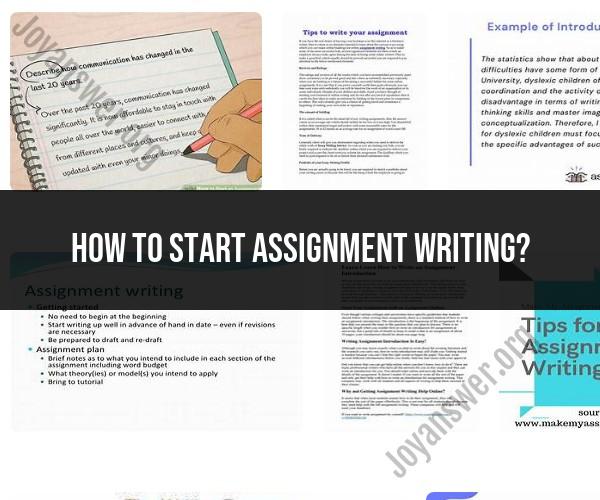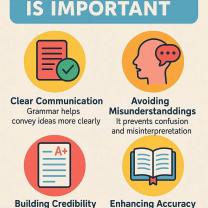How to start assignment writing?
Starting an assignment can be a daunting task, but breaking it down into manageable steps can make the process more approachable. Here's a step-by-step guide to help you start assignment writing effectively:
Understand the Assignment:
- Carefully read the assignment instructions provided by your instructor. Pay attention to the requirements, formatting, word count, and any specific guidelines.
Choose a Topic or Title:
- If the assignment allows you to choose a topic, select one that interests you and is relevant to the assignment's objectives. If the topic is provided, ensure you understand it thoroughly.
Research and Gather Information:
- Start your research to gather information, data, or sources relevant to your topic. Use reliable academic sources, such as books, journals, articles, and reputable websites.
Create an Outline:
- Outline the structure of your assignment. Decide how you'll organize your ideas and arguments. Common structures include an introduction, body paragraphs, and a conclusion.
Thesis Statement or Research Question:
- Develop a clear thesis statement (for essays) or a research question (for research papers). This will serve as the main point you aim to prove or investigate.
Start with an Introduction:
- Begin your assignment with an engaging introduction. State your thesis or research question and provide a brief overview of what your assignment will cover.
Body Paragraphs:
- In the body of your assignment, present your main points and arguments. Each paragraph should focus on a single idea or aspect related to your topic. Use evidence and examples to support your claims.
Cite Your Sources:
- Properly cite all the sources you use in your assignment. Follow the citation style specified in the assignment instructions (e.g., APA, MLA, Chicago).
Analyze and Interpret:
- Analyze the information you've gathered and interpret it in the context of your topic. Explain how your evidence supports your arguments.
Conclusion:
- Summarize the main points and arguments made in the assignment. Restate your thesis or research question and provide a brief final thought or recommendation.
Proofreading and Editing:
- Review your assignment for grammar, spelling, punctuation, and clarity. Ensure it follows the assignment's formatting and citation requirements.
Seek Feedback:
- If possible, ask a peer, friend, or instructor to review your assignment. They can provide valuable feedback and identify areas for improvement.
Revise and Rewrite:
- Based on feedback and your own review, make necessary revisions and rewrite sections that need improvement.
Final Review:
- Give your assignment a final review to ensure it meets all the requirements and is well-organized and coherent.
Submit Your Assignment:
- Follow the submission guidelines provided by your instructor. This may involve submitting a physical copy or using an online platform.
Keep Copies:
- Always keep a copy of your assignment for your records. This can be important in case of technical issues or disputes about submission.
Starting early and managing your time effectively is crucial for assignment writing. Procrastination can lead to stress and subpar work, so plan your time accordingly, and don't hesitate to seek help from instructors, tutors, or writing centers if you encounter challenges during the writing process.
1. How to start writing an assignment
The best way to start writing an assignment is to:
- Read and understand the assignment instructions carefully. Make sure you know what the assignment is asking you to do, what the requirements are, and when it is due.
- Choose a topic or research question. If you are given a choice of topics, choose one that you are interested in and that you have some knowledge of. If you are not given a choice of topics, your assignment instructions will likely provide you with a research question.
- Do your research. Gather information from reliable sources, such as books, articles, and websites. Take notes on your research so that you can easily reference it when you are writing your assignment.
- Create an outline. An outline will help you to organize your thoughts and ideas, and it will make the writing process easier.
- Start writing! Don't worry about making your writing perfect at this stage. Just get your thoughts down on paper (or on the computer). You can always go back and edit later.
2. Key steps in the assignment writing process
The key steps in the assignment writing process are:
- Planning
- Researching
- Writing
- Editing
- Proofreading
Planning: This is the stage where you choose a topic, do your research, and create an outline.
Researching: This is the stage where you gather information from reliable sources.
Writing: This is the stage where you put your thoughts and ideas into words.
Editing: This is the stage where you check your work for grammar, spelling, and punctuation errors. You should also make sure that your writing is clear, concise, and easy to understand.
Proofreading: This is the final stage of the writing process. It is important to proofread your work carefully before submitting it.
3. How to choose a topic or research question for your assignment
If you are given a choice of topics for your assignment, choose one that you are interested in and that you have some knowledge of. You should also consider the following factors when choosing a topic:
- Relevance: Is the topic relevant to the course and the assignment instructions?
- Scope: Is the topic broad enough to cover all of the requirements of the assignment, but not so broad that it is uncontrollable?
- Availability of sources: Is there enough information available on the topic for you to do your research?
If you are not given a choice of topics, your assignment instructions will likely provide you with a research question. A research question is a specific question that you will try to answer in your assignment. When choosing a research question, consider the following factors:
- Is the question clear and concise?
- Is the question researchable?
- Is the question interesting to you?
4. Structure of a typical assignment
The structure of a typical assignment will vary depending on the type of assignment. However, most assignments will include the following elements:
- Introduction: The introduction introduces the topic of the assignment and states the thesis statement. The thesis statement is the main argument or point of the assignment.
- Body paragraphs: The body paragraphs support the thesis statement with evidence from your research. Each body paragraph should focus on one main point.
- Conclusion: The conclusion summarizes the main points of the assignment and restates the thesis statement.
5. How to effectively plan and organize your assignment writing
The best way to effectively plan and organize your assignment writing is to create an outline. An outline will help you to:
- Organize your thoughts and ideas
- Identify the main points of your assignment
- Ensure that your assignment is well-structured
To create an outline, start by brainstorming a list of all of the main points that you want to include in your assignment. Then, group the related points together and arrange them in a logical order.
Once you have created an outline, you can start writing your assignment. Be sure to follow your outline closely so that your assignment is well-organized and easy to read.
Here are some additional tips for effectively planning and organizing your assignment writing:
- Set realistic deadlines for yourself. Don't wait until the last minute to start writing your assignment.
- Break down your assignment into smaller tasks. This will make the writing process less daunting.
- Take breaks. Don't try to write your entire assignment in one sitting.
- Ask for help if you need it. Talk to your instructor or a classmate if you are struggling with any aspect of the assignment.













